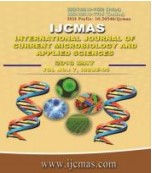


 National Academy of Agricultural Sciences (NAAS)
National Academy of Agricultural Sciences (NAAS)

|
PRINT ISSN : 2319-7692
Online ISSN : 2319-7706 Issues : 12 per year Publisher : Excellent Publishers Email : editorijcmas@gmail.com / submit@ijcmas.com Editor-in-chief: Dr.M.Prakash Index Copernicus ICV 2018: 95.39 NAAS RATING 2020: 5.38 |
In tea during last 50 years, considerable increase in production, productivity and quality of tea achieved because of using various chemical inputs like fertilizers and plant protection chemicals. However, indiscriminate use of chemical inputs degraded soil health and product quality and the environment. Organically produced tea without any hazardous chemicals and residues are better in quality and fetches premium price, make a perfect health drink. Organic tea cultivation is gaining momentum. The feasibility of organic cultivation depends right from planting though recommended dose for organic tea cultivation, particularly for terai region, is not there. So, the present investigation was carried out from 2015 to 2017 and to evaluate the economics of growing tea organically in the initial years among various treatments were - T1: Control (without any organic matter and inorganic fertilizer); T2: Conventional (NPK @ recommended doses); T3: Vermicompost @ 1.0 kg; T4: Vermicompost @ 1.0 kg + (Azotobacter + PSB + Fl.pseudomonas + Azospirillum) each @ 5.0 g/plant; T8: FYM @ 2.5 kg (Azotobacter + VAM + Fl.pseudomonas + Azospirillum) each @ 5.0 g/plant, replicated thrice and laid out in completely randomized block design. The Evaluation of economics including fixed costs and variable costs among the organic treatments T4 was observed to be the best with an income per ha for two years was Rs. 67,876 followed by T5 with Rs. 61,862 per ha. So, from the investigation, by observing the young tea plants only for two years, though it is premature to conclude, it was observed that T4 was the most remunerative treatment of organics for Terai zone of West Bengal.
 |
 |
 |
 |
 |